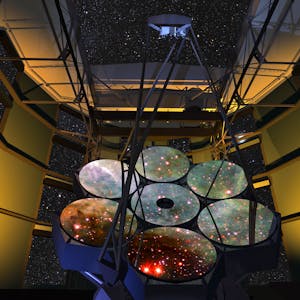This comprehensive course, "Astronomy: Exploring Time and Space," offered by the University of Arizona, is designed to ignite curiosity and provide a deep understanding of modern astronomy. The curriculum caters to both beginners and those with a keen interest in the latest astronomical discoveries. Through engaging content and interactive modules, participants will explore various facets of astronomy, including the history of science, the night sky, tools of astronomy, the solar system, exoplanets, star birth and death, galaxies, cosmology, and life in the universe.
With a perfect blend of theory and practical insights, the course covers the evolution of science, the wonders of the night sky, the tools and techniques used in astronomical research, the formation and exploration of our solar system, the discovery of exoplanets, the life cycle of stars, the mysteries of galaxies, the concept of cosmology, and the potential for life beyond Earth. Participants will also engage in writing assignments, quizzes, and activities, offering a well-rounded learning experience.
Certificate Available ✔
Get Started / More Info
The course "Astronomy: Exploring Time and Space" comprises 11 modules, covering the history of science, the night sky, tools of astronomy, the solar system, exoplanets, star birth and death, galaxies, cosmology, and life in the universe, offering a comprehensive exploration of modern astronomy.
This module provides an introduction to the course and covers essential administrative details, including the syllabus, grading policy, and participation surveys. Participants will also gain insights into the history of science and its relevance to modern astronomy.
Module 2 delves into the intriguing relationship between science and history, exploring ancient astronomy, the Copernican Revolution, and the impact of scientific discoveries on our understanding of the universe. Participants will engage in quizzes and a writing assignment.
The Night Sky module offers a captivating exploration of celestial phenomena, including the daily and annual motion of celestial bodies, the moon, eclipses, and the planets. Participants will also undertake a comprehensive quiz.
This module illuminates the tools and techniques used in astronomy, such as telescopes, detectors, and space-based observations. Participants will delve into the fascinating world of invisible waves and gravitational waves while completing quizzes and a writing assignment.
Participants will explore the fundamental concepts of matter and radiation, including atoms, forces, light, and gravity, while also investigating the energy forms present in the universe. This module incorporates quizzes to assess understanding.
Module 6 uncovers the mysteries of our solar system, delving into the formation of planets, space exploration, and the quest to understand exoplanets. Quizzes and an exploration activity enhance the learning experience.
The Exoplanets module focuses on the detection and characterization of planets beyond our solar system, exploring the potential for habitable worlds and the search for extraterrestrial life. Participants will engage in quizzes and a writing assignment.
This module delves into the life cycle of stars, exploring star formation, evolution, nucleosynthesis, and the intriguing phenomena of supernovae, pulsars, and black holes. Quizzes and a writing assignment deepen participants' understanding.
Module 9 provides a captivating journey through the realm of galaxies, uncovering the mysteries of dark matter, galactic dynamics, and the cosmic expansion. Participants will engage in quizzes and an interactive galaxy observation project.
Module 10 offers an immersive exploration of cosmology, unraveling the scales of space, the Big Bang theory, and the complexities of the universe. Participants will undertake a comprehensive cosmology quiz and a writing assignment.
The final module, "Life in the Universe," delves into the intriguing field of astrobiology, exploring the potential for life beyond Earth and the search for intelligent life in the cosmos. Quizzes and an observing project enrich the learning experience.
Embark on a journey to understand and explore the cosmos in the Pathway to Space specialization at the University of Colorado Boulder.
Kinetics: Modeling the Motions of Spacecraft is an advanced course for engineers and students. It covers topics like rigid body angular momentum, gravity gradient...
Explore the wonders of physics and the great minds behind its discoveries. From ancient Greek thinkers to modern revelations, delve into the universe's mysteries...
This course offers an introduction to condensed matter physics, exploring emergent phenomena and complex systems. Gain insights into phases of matter, universality,...